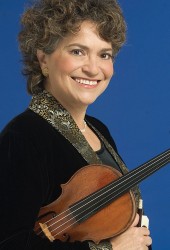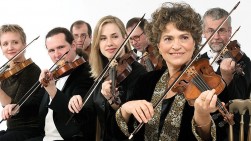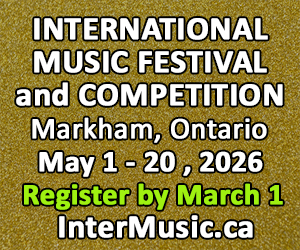 Tafelmusik is a busy orchestra for the next few months, with big programmes in December, January and February. But in late November the tireless Jeanne Lamon, Tafelmusik’s artistic director, found time to sit down for an hour and talk to The WholeNote. In a wide-ranging chat, I talked with her about about her orchestra, the early-music movement in general – and Jeanne Lamon in particular.
Tafelmusik is a busy orchestra for the next few months, with big programmes in December, January and February. But in late November the tireless Jeanne Lamon, Tafelmusik’s artistic director, found time to sit down for an hour and talk to The WholeNote. In a wide-ranging chat, I talked with her about about her orchestra, the early-music movement in general – and Jeanne Lamon in particular.
I thought we’d begin by talking about Tafelmusik’s current status – both in Toronto’s musical community and in the world at large.
Curiously, the answers to those two questions are not the same. I think in the international early-music world we have a very prominent stature, because of the huge amount we’ve recorded, and because we offer a kind of regular employment that no other orchestra does. Every other period orchestra is pretty much a “pick up” group, with freelancers rather than a fixed personnel. And they don’t have anywhere near the size of season that we have: we have a season that’s comparable to a modern symphony orchestra, which makes us unique. If you’re a student studying baroque performance, Tafelmusik is the logical place to want to be because we offer something special.
I don’t think there’s anyone in the early music world who doesn’t know who Tafel-musik is – but I do think there are people in Toronto who don’t know who we are. Toronto is a conservative city, and many people just know a little bit about the arts: they’ve been to the symphony and they’ve been to the ballet, but they may not know what else is out there. If you don’t go past the big institutions, you won’t know that there’s a Tafelmusik out there. Maybe it’s because we also perform in a church, rather than Roy Thomson Hall or some place that people know as a destination.
It’s not like we’re unknown here, but if you go out on the street and ask people “What’s Tafelmusik?”, you might be surprised at how few people could answer the question. Of course, the people who know us love us, and we have a great following. And the professional music community in Toronto thinks highly of us.
Would you say there’s some kind of barrier to your wider recognition in Toronto? I like to think it’s just a matter of time. We’ve been around for almost 30 years – but that’s nothing, in terms of people understanding who we are and what we do. And we’ve only been really prominent and excellent for the last 10 or 15 years. For the first 10 years we were struggling to find our way, and we weren’t always so good at it – we were finding our feet.
Let’s talk a bit more about your core audience in Toronto. What does Tafelmusik’s audience want from you? I think a lot of the Tafelmusik audience just love coming to hear the orchestra and the choir. And at the same time there’s something about the Tafelmusik experience that’s more than just a concert. Many of them want us to do the same old repertoire – but we keep mixing things up, and they seem to be happy about that. I just get a real sense of great love from the audience. I don’t think anyone is there because they feel they’re supposed to be. I sometimes get the feeling that some people go to other concerts like it’s a kind of penance or duty. But there’s none of that here.
I suspect that in the minds of many music enthusiasts, you and your orchestra are sort of “fused”: you are Tafelmusik and Tafelmusik is you. How much of your life is devoted to Tafelmusik – and what else do you do? I’m going to respond to what you said first, and then I’ll answer your question. I like to think that Tafelmusik is more of a collective endeavor, and not an organization that is driven by any one person, or defined by any one person. For instance, Alison Mackay, our double bass player has designed a very creative programme every year for the last four or five years, and some of them, like “The Galileo Project,” are touring worldwide. Another musician, Julia Wedman, designed a programme for Earth Day called “Forces of Nature.” The musicians are very involved: they all sit on committees and are involved in programming decisions.
It’s not that I don’t play a role as the leader – but if I bow out and am not involved in a concert, it’s not like the plug is suddenly pulled. That’s what happens with freelance groups: even if you have a “pick-up” group of very fine players, the group is defined by the personality of the leader. If you take the leader out and tell the players to play, there’s nothing there. I think that Tafelmusik is a very different animal, and I think it’s much healthier as a result because you get a buy-in and an energy from the players. So some people may think I’m Tafelmusik, but that’s not the complete reality.
So what else do you do? Tafelmusik is probably about 90 percent of what I do. But if I list the other 10 percent, it will probably sound like another full time job. I guest direct: I’m going to the Victoria Symphony next week. I work with Symphony Nova Scotia every year, and I’ll be going again in March. In January I’m going to work with Orchestra London. Next season I’m going back to Les Violons du Roy in Quebec City, which I’ve done a number of times. As well, next year I’m going to be working at the University of Ottawa, and also with the Kingston Symphony. So I get around – almost exclusively in Canada, although I have worked in Detroit.
The other thing I do is teach. I teach for Tafelmusik Summer Institute, but I also teach baroque violin independently. Right now I have only two students, but they’re both very keen and very ambitious.
What about an independent solo performing career? Do you go around playing concertos? Not as such. I mostly guest direct, but in the context of guest directing I may play a concerto or something. But it’s more about directing. For me, the directing is educational – it’s about passing on the enthusiasm for baroque music. And the people in symphony orchestras are really keen: they want to understand more about baroque performance. There’s no longer the resistance there used to be from traditional orchestras. I used to find resistance, but now I find a lot of enthusiasm. It’s very exciting to work with them on this repertoire. When the rehearsal is over, they don’t run away – they come running up to me with a million questions.
Do you have personal favourite composers and repertoire? It does change – it’s a “love the one you’re with” kind of thing. But the staples I always fall back on are Bach and Monteverdi – and Purcell, and Rameau, and Handel. It depends on the repertoire. For me, Bach is all about sacred music, and Handel is operas, and Mozart is everything. When I’m busy preparing for a performance I’m working well ahead of the first rehearsal, and by the time the first rehearsal comes, I’ve got it all memorized. So whatever music I’m living with, it becomes my world. Then after the concert, it mysteriously evaporates. It’s strange: I can be completely obsessed with one thing for a whole month. Then the last performance happens, I go out and have a beer, and the next morning I wake up and it’s gone.
The composers you mentioned are all big names in the canon. In your years of working in early music, are there any lesser-known composers who have impressed you? Biber is a wonderful composer – I think most violinists love Biber. Another composer, Schmelzer, is in his shadow a bit, and he doesn’t get his due. We did an entire CD of the music of Schmelzer. I spent several months completely immersed in Schmelzer, and at that time I would have said that Schmelzer was my favourite composer! Because we did a whole CD of his music, I discovered a whole personality that I didn’t know existed. It’s a very interesting thing to find the “entrance way” into a composer’s work, and that’s what we try to do. If you just do one little piece by one composer and another little piece by another, you might not ever crack that nut.
And there are various levels of the canon. At the very top you have Bach and Mozart. Even Handel isn’t up there: even though he’s extremely popular, he’s about a quarter of a millimeter lower on the list. And the reason I say that is because people compare Handel to Bach, and because he’s not Bach – he’s somebody else, with a different personality and aesthetic – they say he’s lesser. What I’ve discovered, more and more, is that composers all have their own language. I had no idea, until about 15 years ago how, humorous Telemann was. And if you don’t see it that way, it sounds like bad Bach, or second-rate Handel.
I get the sense that amongst musicians who specialize in the baroque that there’s been a kind of settling of the repertoire. Is the repertoire less adventurous than it was 25 years ago? I agree with that. I think we have to balance the canon, which is worth hearing and people will buy tickets to hear, with adventurous music-making. The sense of adventure we had when we started out is something we need to hold on to.
One of the changes in the early music world in the last 25 years has been a move away from the word “authentic” and towards the phrase “historically informed.” In your view, what was that all about? There are two reasons why the term “historically informed” has stuck. If you think about the word “authentic,” what’s the opposite? Are you therefore saying that something else is not real? It’s both insulting and inaccurate. Other terms also have problems. “Early music” implies that it’s music before 1750, and everything else is something else. But it’s not about when the music was written, but about how you approach the music. “Historically informed” gets around all that: it’s not about what is or isn’t “authentic,” or when the music was written. Historically informed is about context. It means, “I know a lot about this.” It doesn’t mean I’m married to the exact reproduction of every detail.
 To what extent have the values of the early music movement been absorbed by “mainstream” players? I think there’s definitely been a shift. It’s one of those things when you wake up one day and realize that you’ve been in the centre of the revolution – the world has changed. Symphony orchestras, if they’re doing baroque things, tend to bring in specialists. They don’t usually do it with their own conductors, unless their conductor happens to be someone who knows a lot about baroque performance, like Simon Rattle. And I think there’s a lot less animosity today. When we first started, there was a lot of real animosity, like we were taking their territory away. But now there’s more a sense of sharing.
To what extent have the values of the early music movement been absorbed by “mainstream” players? I think there’s definitely been a shift. It’s one of those things when you wake up one day and realize that you’ve been in the centre of the revolution – the world has changed. Symphony orchestras, if they’re doing baroque things, tend to bring in specialists. They don’t usually do it with their own conductors, unless their conductor happens to be someone who knows a lot about baroque performance, like Simon Rattle. And I think there’s a lot less animosity today. When we first started, there was a lot of real animosity, like we were taking their territory away. But now there’s more a sense of sharing.
I’ve noticed that “mainstream” orchestras don’t very often play those big Bach-Stokowksi arrangements or Hamilton Harty’s Handel any more. Do you think the early music movement has something to do with that? Absolutely. I think that repertoire has lost its lustre. A Stokowski arrangement is beautiful in its own way, but it’s very much a period piece. It was popular in the mid-20th century – and it was really not about Bach, it was about Stokowski. It had its charms, but now we’re hearing Bach differently. That’s my personal view of it.
Getting back to Tafelmusik, what are you doing these days that’s new and different? We just did a programme of Chopin on period piano – we’ve never done that before. And some of Alison Mackay’s programming that I referred to earlier involved multi-media, acting and visual arts. But it’s always a concert where the “other things” are there to give the music context. It’s not like we’re doing something that you can’t really identify as a concert any more – it’s concerts with more context, both historical and contemporary.
We’re making films from time to time. We have two in the works: our “Galileo Project” and our “Sing-Along Messiah.” And we have quite a presence online and on social media. That’s exciting because it gives us new ways to get out to the world. We’ve made some YouTube videos, for example, which there would have been no reason to make five years ago – there was nowhere to put them. So we’re doing new things with formats as well as content.
You mentioned your recent Chopin concert – and you did some Mendelssohn last year. How far do you plan to advance into the 19th century? Will you do Wagner in 2013, for his 200th birthday? Not in 2013 – but I won’t say we’ll never do Wagner. But we’re always musically curious to explore things that are new and different. The Chopin was certainly a stretch for us – but I can remember the first time we did Mozart, and now Mozart is absolutely standard for us. This year we’re finally doing Beethoven’s Ninth: that’s a bit of a stretch for us, and we love doing it. How far will that go? I don’t know. I imagine Schumann isn’t too far away, and I’d love to do Berlioz. But the 19th century will never be the core of our repertoire: we’re not going to be a romantic orchestra. The baroque and classical will always be the core.
You’ve done some contemporary music, too. We have done some. I’m always looking for composers who are turned on by composers and want to write specifically for our instruments. We’ve had some wonderful experiences with Canadian composers – but we’ve also had some experiences where they’ve written sort of regardless of our instruments. So we’ve had some mixed experiences. We continue to explore that by commissioning one new piece a year. I’ve often thought that it would be nice to have a composer in residence who would work with us over a period of time, and get to know the orchestra. That’s a long-range plan.
More immediately, you look to be pretty busy over the next couple of months. We have Mozart’s Symphony No. 1 coming up. I don’t think anyone ever does it, so that will be great. And our Messiah is a holiday tradition – but it’s different every year because the cast is different. This year we have one of the best casts we’ve ever had. There’s not a weak singer amongst them.
And of course there’s your “Sing-Along Messiah.” Yes, and we’re busy making a film about that – it will be broadcast on Bravo! Television on December 6 at 9 o’clock.
In January, the “Bach at the Coffee House” programme must be dear to your heart. We know about Bach’s obligations to provide music for church on Sundays. There was another part of Bach’s output, because he was the director of the Collegium at Zimmerman’s Coffee House. It was the beginning of concert culture. It’s fun to figure out what they played, and what it would have been like to go there.
And in February, Bach’s Mass in B Minor is no small undertaking. No it’s not – and it’s a piece that certainly deserves to be in the canon.
I expect you keep your ears to the ground. What do you think of some of the younger early-music groups out there? There’s so much happening that I don’t know everyone. But there are some very good young people out there. It goes in waves: there was a time, about 10 years ago, when I thought that maybe early music was coming to an end, because there didn’t seem to be anyone picking it up and running with it. Now there’s so much going on – so much energy and talent. It’s a very rich time for baroque performance.
Colin Eatock is the managing editor of The WholeNote.



